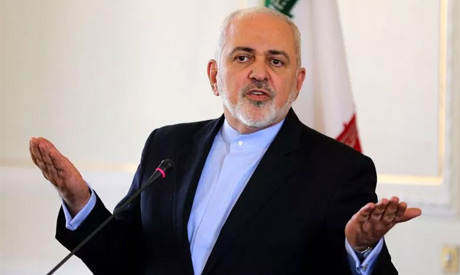
File Photo: Iranian Foreign Minister Mohammad Javad Zarif (Photo: Reuters)
Iranian Foreign Minister Mohamed Javad Zarif said on Sunday that Iran might withdraw from the Nuclear Non-Proliferation Treaty amid tightening US sanctions.
“The Islamic Republic’s choices are numerous, and the country’s authorities are considering them... leaving [the Nuclear Non-Proliferation Treaty] is one of them,” Zarif was quoted as saying by a state broadcaster, according to Reuters.
Speaking first at the Asia Society in New York and then on the US news channels NBC and Fox News, Zarif used every opportunity to draw US President Donald Trump’s attention to his presence in the United States.
Ordinarily, the Iranian foreign minister would be in New York for the UN General Assembly in September, when Americans are used to seeing the Iranian president and foreign minister around town.
However, the UN calendar also contains a conference on the International Day of Multilateralism and Diplomacy, and this fits well with Zarif’s aim to be in the US.
With Trump now tightening the sanctions against Iran, Zarif’s presence on the US media was an attempt at opening channels with the US administration. Zarif particularly chose to appear on Fox News, a channel known to be favoured by Trump and the only one he watches.
Zarif also talked about negotiating on prisoner swaps or the fate of the hostages the Islamic Republic is holding.
Since the Islamic Revolution in Iran in 1979, no US politician has visited the country. Relations were broken off after the hostage crisis in 1979 when American diplomats in the US Embassy in Tehran were taken hostage for 444 days, leaving behind bitter memories and animosity.
Many Americans still remember the hostage crisis, and Zarif’s media interviews last week would have reminded them of how revolutionary groups in Tehran had handcuffed and blindfolded the diplomats and never apologised for their behaviour.
Iran’s foreign minister in the US for a UN event but appearing on the US media to talk about the fate of Americans held in Iran would have brought back painful memories.
Dual citizenship is not recognised in Iran, and the Islamic Republic does not accept any political motivation behind the hostage taking of dual citizens or foreign nationals arrested in Iran and charged with spying.
However, most of the allegations against them are unclear, and those convicted have not had a fair trial or access to a lawyer.
Zarif mentioned Iranians held in the US or other countries at the US government’s request. The most famous, serving a 25-year prison sentence in the US, is Mansour Arbabsiar, arrested on 11 October 2011 in the wake of allegations of a plot to assassinate Saudi ambassador Adel Al-Jubeir in the United States.
Iranian nationals Mansour Arbabsiar and Gholam Shakuri were charged in a federal court in New York with plotting to assassinate Al-Jubeir. With the exception of these individuals, it was not clear who Zarif was talking about or wishing to exchange with the Americans held hostage in Iran when he spoke to Fox News.
It seems Iran was mainly interested in finding a channel to speak to Trump directly, perhaps as a way of pleading for the sanctions, due to be imposed on 1 May, to be eased. Trump has said he will not extend exemptions for countries importing Iranian oil.
However, given the public sensitivity in the US about holding Americans as prisoners or hostages, Zarif’s comments may have caused negative impacts in the US and have had the opposite effects to those intended.
Trump has not yet tweeted to say if he saw Zarif’s interview or what he thinks of the Iranian offer, but he will likely see Zarif and other Iranian officials again in September at the UN General Assembly.
On this occasion, he may be presented with another Iranian offer and also a request for an interview.
*A version of this article appears in print in the 2 May, 2019 edition of Al-Ahram Weekly under the headline: Iran’s media offers
Short link: